The events industry is actively recovering after the painful pandemic collapse. Despite the emergence of virtual and hybrid events, the number of both leisure and corporate in-person events is growing rapidly. So, by 2028, the global events industry value is expected to reach $1,553 billion, up from $1,135 in 2019.
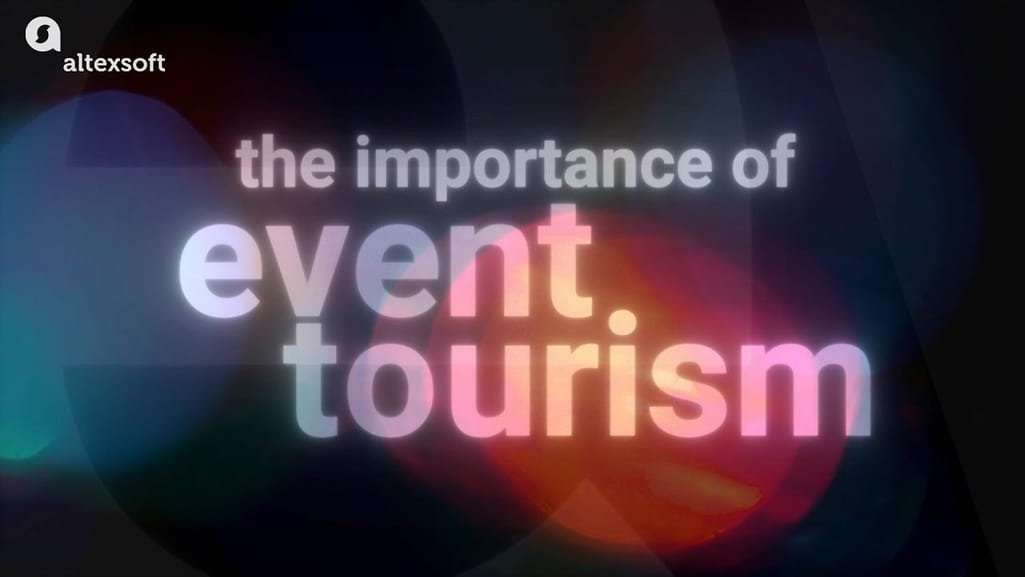

Event tourism explained
The recent IACC study revealed the importance of human interaction at live meetings, so most venue operators worldwide optimistically expect to get to the revenue levels of 2019 as soon as the end of 2022 or early 2023.
As you prepare for the long-awaited business renewal, let’s talk about the event booking technology that can support and streamline your activities. But first, let’s start with discussing your likely needs as a venue manager.
Learn about event management software in our latest article.
What is venue management?
Venue management is a set of activities that involves maintaining the venue facilities, as well as arranging and supervising events. Definitely, a concrete list of responsibilities depends on a specific venue and its size (sometimes there might even be multiple locations), i.e., a convention center, a theater, a stadium, a hotel, or any other hosting location. But here’s what venue managers usually do.
- Handle bookings, discuss client requirements, and arrange a smooth schedule of upcoming events.
- Set price packages and pricing options as the required services and their volume may vary across clients.
- Communicate with all parties involved, i.e., clients, event managers, and external vendors/service providers (logistics, catering, decorations, sound equipment, etc.), and maintain relationships for future cooperation.
- Oversee all the operations, supervise venue staff and external service providers, and solve any issues that may arise.
- Ensure location cleanliness and safety, taking care of the maintenance, repairs, and cleanups of venue assets and facilities.
- Conduct marketing activities to promote the venue across different channels.
- Do administrative jobs such as invoicing, reporting, and so on.
Well, that’s a monster workload to handle, especially at a popular location during a high-demand season. Good news – you don’t have to do all that manually and keep all the details of all events in your brain. There’s a piece of technology that can take a part of this burden off your shoulders.
Event booking software and its main features
Event booking software or venue management software is a digital tool that, well, helps venue managers do their daily tasks of maintaining the location and arranging events. A good event booking tool is more than just a digital calendar. Such software serves as a database of essential information such as customer contact details and event requirements, and in addition helps sell your space, allows you to efficiently handle event bookings, and automates a number of operations.
Obviously, such platforms differ greatly since some are focused on certain types of venues while others only cover a part of the sought-after functionality. But still, let’s discuss the most common functionality so that you see how it can come in handy.
Event booking software main features
Interactive floor plans and 3D tours
To attract customers and event planners, you have to showcase your venue. Most likely, you have a website where you provide all the information about your location (descriptions, photos, capacity, etc.), which makes sense to complement with interactive floor plans so that potential clients get a clear picture of your event space.
Specialized software provides templates that allow you create such plans and diagrams. You can build custom designs of any scale, from floor plans to room diagrams, table setups, and seating charts.
Floor plans by Social Tables
Moreover, you can create a virtual 3D tour of your venue to bring it to life, deliver an immersive experience, and give the realistic feel of the place.
Response automation and lead scoring
Now that you have a beautiful presentation of your venue, you might get flooded with inquiries and RFPs. All the clients want to receive prompt replies, but worry not. There’s a life-saving response automation feature. It can be as simple as an automatic email with a receipt confirmation and an estimate of when you'll respond with your proposal. Other platforms allow you to set up business rules to reply with auto-generated quotes and contracts.
Or, some platforms offer an automatic lead scoring feature that ranks your leads and prioritizes the ones that are the best fit and bring the most profit so that you can focus on the most qualified prospects.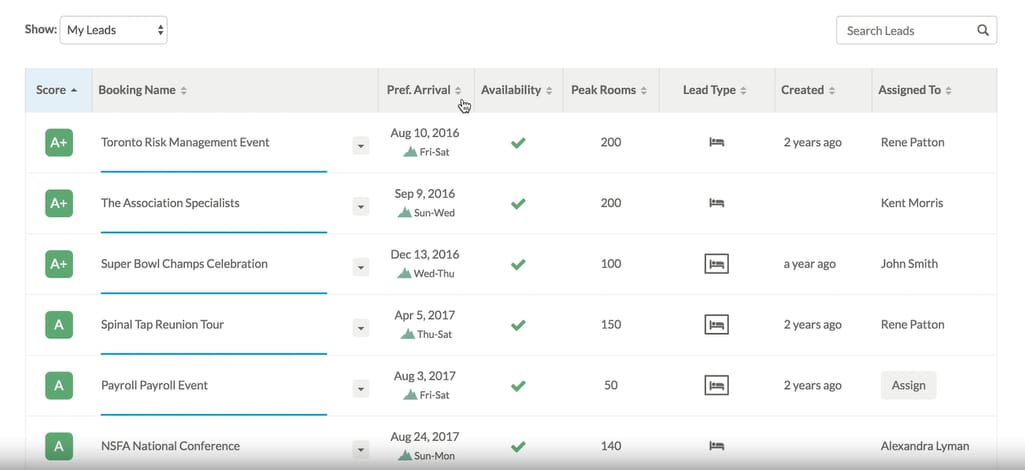
Leads sorted by score. Source: Cvent
Event calendar
As you sell your event space, you must keep track of upcoming events and make sure there is no overbooking or overlapping. An event calendar is vital to visualize your schedule and enhance your planning.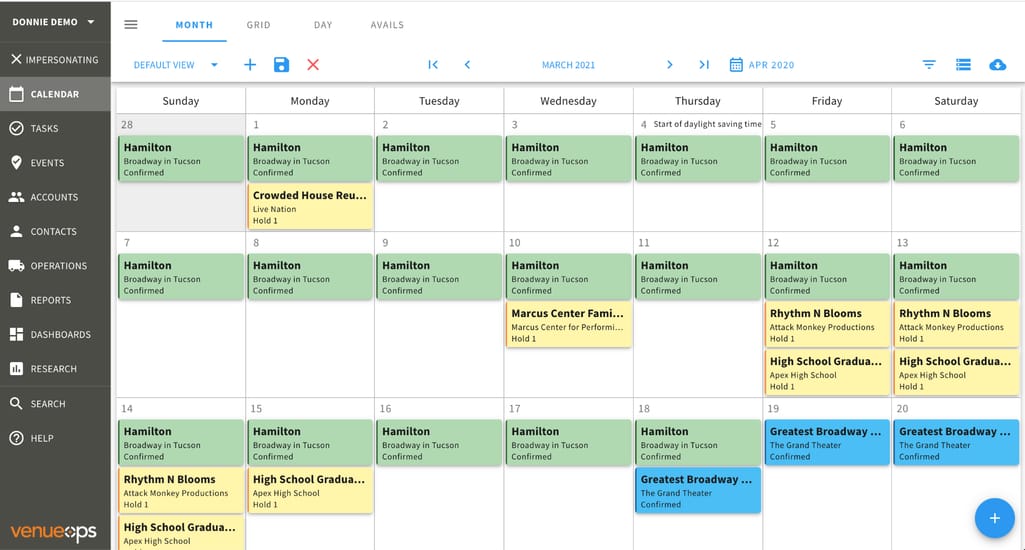
VenueOps calendar
Many platforms offer a convenient integration with Google or Outlook calendars for you to keep all your tasks and plans in one place.
Another useful calendar-related functionality is automated dates suggestion. If the dates requested in the RFP are already taken, the digital tool can automatically find and suggest alternative dates that fit the requirements.
Customer portal, payments, and e-signatures
Depending on your type of venue, you might want a customer portal to offer self-booking functionality. In this case, your clients and external event planners will be able to view and reserve available slots of their choice.
You might also want to provide online payment ability. There are software platforms that come pre-integrated with Stripe or other secure payment gateway provider that safely processes multiple payment methods.
Another useful feature is the ability to e-sign contracts. Most venue management systems allow you to generate contracts and securely collect online signatures either via customer portals or through an email link. Downloadable, printable PDF versions should be provided as well.
Event management
Usually it’s event managers who must make sure that everything goes smoothly. However, venue managers should also stay on top of what’s going on at their location and jump in whenever any issues arise. For that, you need an accurate, detailed event timeline with all the related requirements, designated staff, and other information.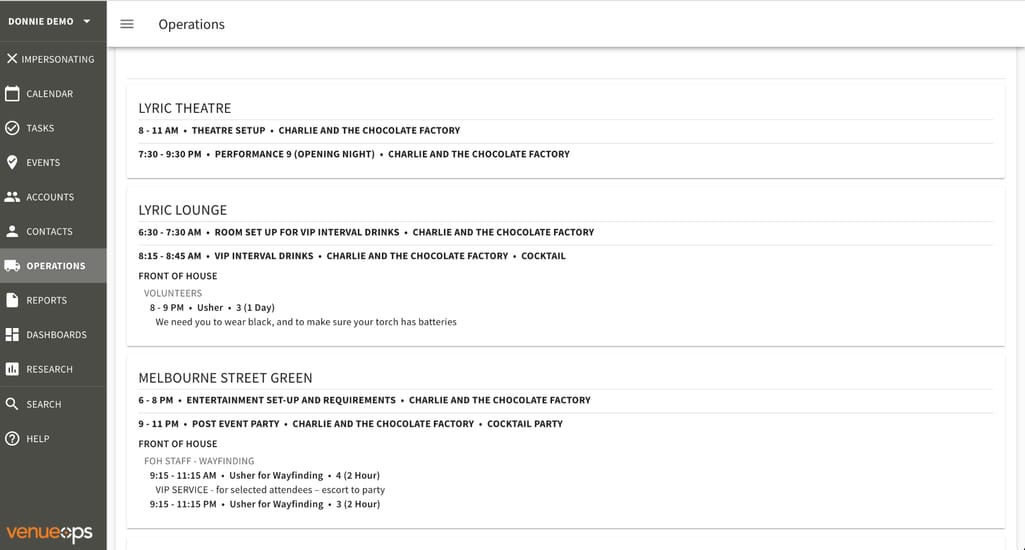
Event timeline in VenueOps
Software will allow you to store all the important details and assign staff members to take care of different aspects. You’ll be able to communicate, share timelines and files, build checklists, set reminders, and so on.
Customer relationship management (CRM)
A CRM is a must-have tool in your job. Not only does it serve as a digital phonebook, it also helps cultivate and enhance relationships with your customers. You’ll be able to
- generate customized proposals and contracts,
- manage sales opportunities,
- automate follow-up activities,
- collect and analyze feedback,
- consolidate all communications across multiple channels,
- track collaboration history, and more.
A well-built CRM system might actually include additional functionality such as price setting, marketing support, and lead scoring that we mentioned above.
Marketing module
Running marketing campaigns is no day at the beach. You might have a focused marketing department to take care of all the promotions and other activities – or not. In the second case, it’s going to be on you, so a marketing module will be of great help. By the way, it also often comes as part of the CRM.
A marketing tool can help you track your website performance and visitor behavior, automate and personalize your email marketing, improve your SEO, manage your ads, keep track of your social media activity, and so on.
Administrative module: invoicing, reporting, and analytics
Even though your job mostly involves dealing with people, paperwork and finances are still inevitable. Software can streamline these operations by automatically creating and sending invoices, keeping track of payment schedules and your business expenses, managing customer deposits, etc.
The reporting/analytics capabilities are also important since they will allow you to monitor how well your venue is performing, track sales activities, and more. The best way to develop is to get the full view of your operations, define your strengths and weaknesses, and outline further strategy based on accurate, complete data.
Additional features
Again, depending on your venue type and your business needs, you might require additional functionality. Here are some of the options that can be found.
Facility management. If you are responsible for venue maintenance, check the products with the facility management functionality to streamline your inventory management, repairs, compliance documents management, and so on.
Artist search. Some platforms are integrated with artist databases so that you can easily find performers for your events.
Integrations. You might be already using some types of software, for example, Microsoft or Google office products, accounting systems, communication tools, or a CRM. Check if there are any out-of-the-box integrations provided and ensure that at the end of the day all your systems are seamlessly connected.
Event booking software providers
Okay, we’ll be honest. No software is perfect, suiting all the business needs of any venue manager. There’s a chance that you won’t be able to find the off-the-shelf product that has all the features you need. So what can you do?
First option, you can implement several separate tools to cover your most critical workflows. For example, get an event calendar to handle bookings and a full-fledged CRM with marketing and reporting functionality included. You can also select the most fitting venue management system and tailor it to your requirements or add the lacking features. In both cases, you’ll have to engage IT specialists either to integrate the chosen tools or customize your software.
Another option is building custom venue management software from scratch. Such a project requires time and significant investment, but ultimately you’re getting a bespoke tool designed to perfectly fit your unique business needs.
To give you an idea of existing products and help you decide which of the options works best for your company, let’s take a quick look at what's on the market. We’ll only explore venue-independent solutions that can benefit multiple venue types.
Venue management software tools compared
Planning Pod: a one-stop-shop for any venue type
Best for: any venue type
Planning Pod offers three main digital products: Venue Management Software, Event Management Software, and Floor Plan Software (this one is included in the other two). The venue management tool boasts the ability to replace 20+ standalone tools as it covers most workflows including event bookings and overseeing, communications, sales, finance, marketing, reporting, and much more.
Planning Pod offers a customer portal for self-booking, several payment options, an easy-to-use floor plan tool, digital signatures feature, food and beverage sales management, etc. It helps manage all event details in one place and supports efficient collaboration between teams.
VenueOps: a full-fledged management solution for big venues
Best for: enterprise venues
VenueOps is the product of EventBooking that recently merged with another industry leading software provider Ungerboeck. It caters to convention centers, performing arts centers/theaters, arenas/stadiums, and other venue types. The platform’s features include
- Sales CRM and Account Management,
- Event Management,
- Operations,
- Finance,
- Artist Research (has social metrics and tour schedules integrated from Pollstar and Chartmetric),
- Online Exhibitor Ordering (allows exhibitors to create, manage, and pay for any order requirements), and more.
VenueOps doesn’t have a comprehensive customer portal or floor planning functionality, but it supports the majority of important workflows, including marketing, reporting, and contract management. It also offers a number of integrations out of the box such as Tessitura, DocuSign, Simpleview CRM, as well as calendar synchronization with external apps.
VenuePro: a smart modular platform for holistic venue and event management
Best for: tech-focused venues of any type
VenuePro is an innovative solution that allows users to streamline both venue and event management operations. It provides maximum flexibility as it offers 17 modules that you can choose depending on your business requirements.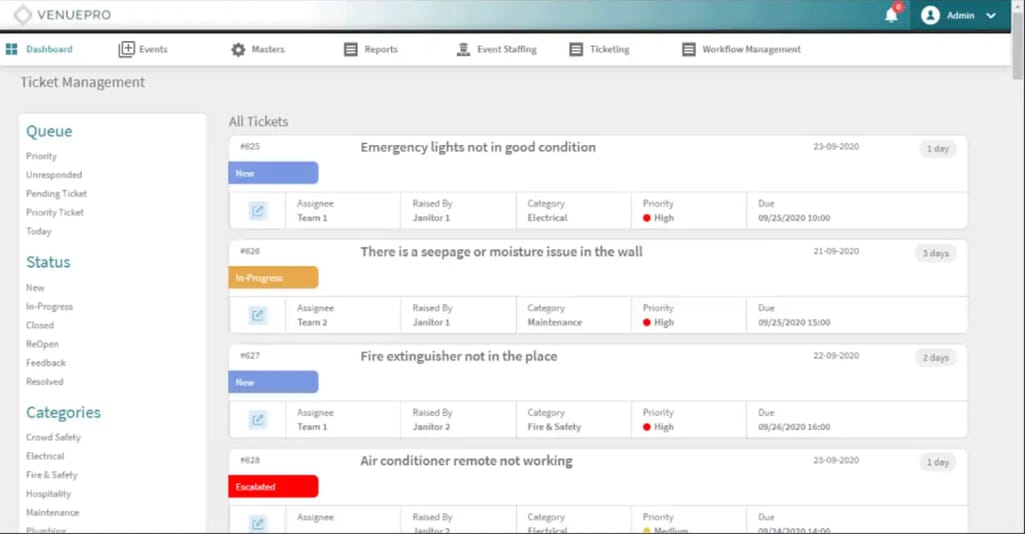
VenuePro Facilities management dashboard
Besides common features, VenuePro offers
- Facilities management and maintenance,
- Incidents investigation,
- Lost and found,
- Staffing,
- Inventory,
- Control room dashboard, and more.
VenuePro also offers building an unparalleled Internet of Things (IoT) infrastructure, integrating thermal cameras, leakage sensors, and other smart devices for gaining full control and visibility into asset condition and event operations. Such modern connected technologies allow for remote occupancy tracking, proactive maintenance, staff registering via facial recognition, smart asset monitoring, etc.
Skedda: a user-friendly space scheduling solution
Best for: small to midsize venues
Skedda is a scheduling and space booking platform with an easy-to-use, self-service interface for a variety of venue types such as universities, coworking spaces, studios, sports/fitness venues, and so on. It allows you to create interactive maps with detailed layouts and set up booking business rules to regulate user interaction with the platform.
Skedda supports multiple login options and offers secure payment processing with Stripe. There’s also a number of built-in integrations with finance and communication tools, popular calendars, and Google Workplace.
What else to consider when choosing event booking software?
If you decide to go with the ready-made software, obviously, the most important factors are pricing and functionality. However, there is more to look at. Here are a few tips for you.
Mobile-friendliness. Today, the world functions on the go, so your digital tool must be accessible from any device.
User access permissions. Check that you can set up a range of user entry levels to limit access to important or sensitive information.
Scalability. If you have ambitious development plans, make sure the product you choose will be able to support them and handle the increased operational flow.
Security. You’ll probably store a lot of personal data in the system, so be sure it’s secure. And if you plan to receive online payments, remember about PCI compliance.
Customer support. Make sure you’ll always receive all the assistance you need from your provider whenever you have questions or issues. Ask if they provide learning materials and training sessions to teach your staff.
Integrations. We’ve already mentioned this one, but we still want to emphasize that having all your software tools connected in one system is crucial for smooth data exchange and efficient performance of all its parts.
The events industry is very diverse and no two venues are the same. But today is the digital era when all businesses come to realize the benefits technology brings. Enhancing your operations with venue management software will give you a competitive advantage, streamline processes, and generate additional revenue opportunities.

Maria is a curious researcher, passionate about discovering how technologies change the world. She started her career in logistics but has dedicated the last five years to exploring travel tech, large travel businesses, and product management best practices.
Want to write an article for our blog? Read our requirements and guidelines to become a contributor.

